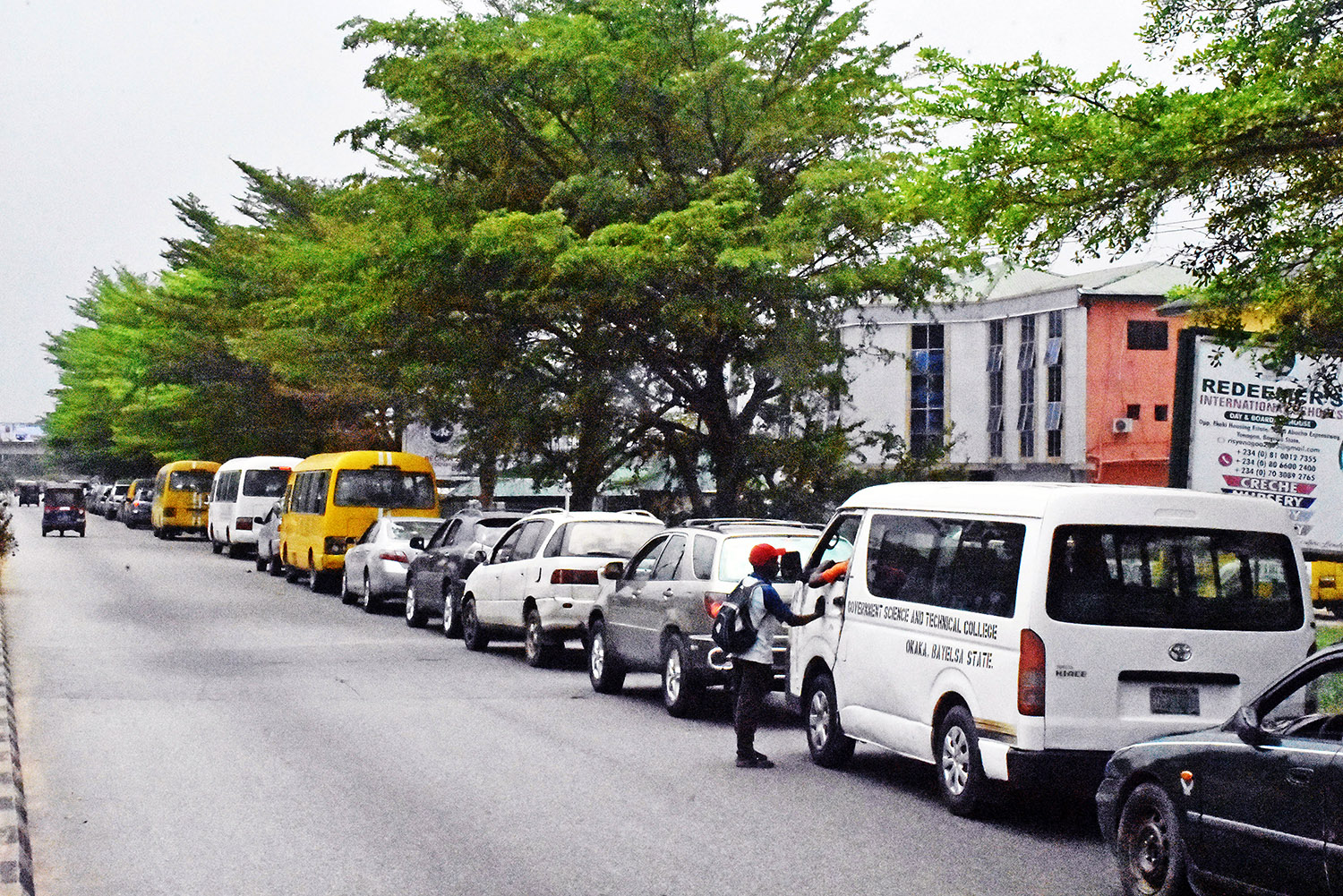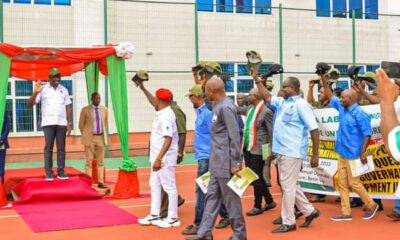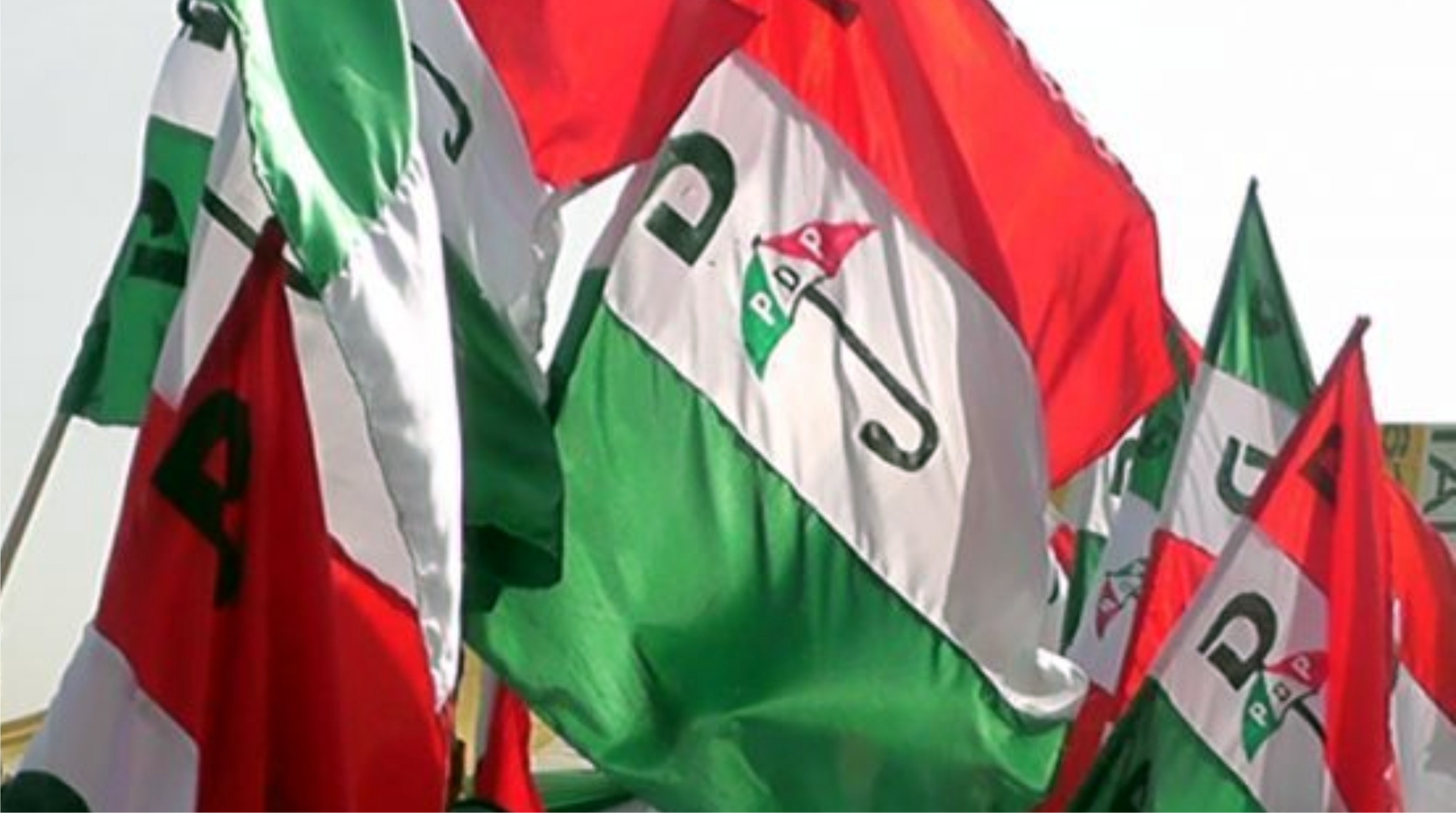Business
Is Joint LG, State Account System Useful?
Analysts observe that
the reason for creating the State Joint Local Government Account System by section 162 of the 1999 Constitution is to facilitate developments at the grassroots.
They note that the system is expected to ensure effective supervision of the distribution and efficient management of revenue accruing to the local governments from the Federation Account.
They, however, observe that instead of being a useful system for rural development, the joint account system has, somewhat, negated the reason for its creation.
“The system serves as a means of making unnecessary deductions from revenue accruing to the local governments from Federation Account to the coffers of state governments in Nigeria,’’ the analysts note.
In his view, Mr lawal Ibrahim, a public policy analyst, described the joint account as a fraudulent practice aimed at looting public treasury.
He said that unless the system was modified, it would be difficult for the local governments to develop through the system.
He solicited the separation of roles for the two tiers of government in the bid to deliver the dividends of democracy to the people at the grassroots.
“ State Joint Local Government Account System is the first step to stealing. State government should just contend itself with the supervisory role to the local governments.
“Let everybody be separately accountable for what it does. I think that is what the law of the land says,’’ he said.
Similarly, Dr Francis Fagboun, the Head of Local Government Studies Department, Obafemi Awolowo University, Ile-Ife, urged President Muhammadu Buhari to “liberate local governments from the shackles of state governors.’’
Expressing similar concern about the system, Mr Kola Adewusi, a former Chairman, Ife East Local Government Area in Osun, noted that there was extensive misappropriation of funds meant for local governments through the system.
To check this, Dr Michael Oke of the Department of Banking and Finance, Ekiti State University, Ado Ekiti, said local government councils should be autonomous in accordance with Section 162 Sub-section 6 and Sub-section 7 of the constitution.
He observed that successive local government administrations had not been able to perform because of state governments’ opposition to financially-autonomous local governments.
He insisted that the local government should, statutorily, take care of projects such as pipe-borne water.
“But these and lots more cannot be achieved because its finance is under the supervision of the state government.
“As a result of this, the local government in the country can no longer embark on any development projects,’’ he said.
But Mr Deji Gbadeyan, a constitutional lawyer, said that Section 162 Sub-section 6 and Sub-section 7 of the constitution were meant to protect the autonomy of local governments.
He attributed the loss of local government autonomy to the misinterpretation of the sections.
“There is nothing wrong with section 162, it is a perfect law, only the interpretation by the stakeholders is questionable,’’ he observed.
Gbadeyan pointed out that those who drafted the constitution never anticipated the sort of massive fraud that was rampant in local government administrations.
“Section 162 of the constitution was enacted to make the local governments more vibrant and development-oriented.
“But what we are seeing today in the interpretation of the section is that allocation to the local government from Federation Account now passes through the state government which keeps it on hold.
“Local government and the state will meet on the issue of state finance where the state dictates what quantum of finance should go to the local government,’’ he said.
He observed that Section 162 of the constitution had always been preventing the presidency from enforcing financial autonomy of local governments.
Narrating the experience of the local governments, Mr Kayode Akande, the Chairman of the Nigeria Union of Local Government Employees, Ibadan North Local Government Council of Oyo State, expressed regrets that local governments were grossly underfunded.
“There is little money left for development projects after payment of salaries due to the operation of the joint account.
He canvassed autonomy for local governments, insisting that it would enable them to pursue grassroots sustainable projects.
“Non-payment of salaries to workers at the state level by the state governments has affected the local government workers who have also not been able to receive their salaries.
“Assuming autonomy has been granted, funds would be accruing directly to the local government and the issue of non-payment of salaries would not have arisen,’’ he said.
Irrespective of these views, Gov. Ibikunle Amosun of Ogun, said local governments in the state would collapse if they were granted autonomy.
He expressed the opinion while reacting to President Muhammadu Buhari’s comment on State Joint Local Government Account System in his inaugural speech on May 29.
Amosun said that it would be in his interest if local governments were granted autonomy because it would remove a lot of responsibilities from the state government.
He, however, noted that the local governments do not have the capacity to generate enough funds to meet their responsibilities, insisting that “they will be on their own.
“Some governors said that granting autonomy to council areas is not going to favour them.
“Those governors that say that the autonomy thing will not favour them are those governors that deduct from local government allocation from the federal allocation.
“Truly, what is coming from the federal allocation is no longer enough, for me, this development will even put more challenges on the council areas.
“If they want autonomy, let them take their autonomy, if they can’t pay salaries, they won’t come back to me.
“If they can’t pay teachers or embark on developmental projects, they will know that they are the ones that cannot pay and not the state.
“But, I want to say here that the way it is, they cannot pay salaries; if they have the autonomy they are craving for, definitely they will be on their own completely.
“They need the support of the state. That has been my experience since I became the governor.’’
Observers, nonetheless, noted that since majority of houses of assemblies had voted against local government financial autonomy during the recent National Conference on Constitution Review, granting it may be difficult.
Adeoti writes for the News Agency of Nigeria
Victor Adeoti
Business
Fuel Scarcity: IPMAN threatens shutdown over bridging claims

The Independent Petroleum Marketers Association of Nigeria (IPMAN) Depot Chairmen Forum, has exonerated its members from the current fuel scarcity in the country.
According to IPMAN, this is caused by its inability to source petroleum products.
The IPMAN Depot Chairmen Forum also threatened to withdraw its services over non-payment of N200 billion bridging claims by the Nigerian Midstream and Downstream Petroleum Regulatory Authority (NMDPRA) to its members, since 2022.
Alhaji Yahaya Alhassan, the Chairman, of the Forum said this while briefing newsmen in Abuja, yesterday.
Alhassan said the Nigerian National Petroleum Company Limited (NNPC Ltd.) was the sole importer of the product, but the marketers could not source products from NNPC Ltd. deport, rather from the private depots at high rate.
“We cannot buy fuel from the private depots at N950 and transport the product from Lagos to the North and other parts of the country with N2 million and still sell it at N900 or N1, 000.
“It is expedient for us to state that we are more pained by the non-availability of petroleum products in the country, which has given rise to another round of untold hardship for Nigerians.
“Contrary to claims that IPMAN members are hoarding Premium Motor Spirit (PMS) known as fuel, we would like to categorically state that PMS scarcity is wholly triggered by inability to get fuel from NNPC and not IPMAN,’’ he said.
Meanwhile, the NNPC Ltd. Chief Corporate Communications Officer, Olufemi Soneye said the disruption was due to logistical issues which had since been resolved.
“We currently have an availability of products exceeding 1.5 billion litres, which can last for at least 30 days. Unfortunately, we experienced a three-day disruption in distribution due to logistical issues, which has since been resolved.
“However, as you know, overcoming such disruptions typically requires double the amount of time to return to normal operations.
“Some folks are taking advantage of this situation to maximise profits. Thankfully, product scarcity has been minimal lately, but these folks might be exploiting the situation for unwarranted gain,’’ Soneye said.
He however, said the lines would clear out soon.
On the non-payment of bridging claims, the IPMAN forum said it was distressed and depressed by the laidback attitude of the NMDPRA towards the survival its member’s businesses, arising from its refusal in paying the claims.
“It is with deep frustration that we have assembled here today as the IPMAN Depot Chairmen Forum. It is also disheartening to note that some of our members have completely shut down businesses and retrenched employees.
“As businessmen and women, our members acquired bank loans to keep their fuel retail outlets running on a daily basis across the nooks and crannies of Nigeria in order to serve the teeming population of Nigerians,’’ Alhassan said.
He recalled that Sen. Heineken Lokpobiri, Minister of State Petroleum Resources (Oil), at a stakeholders meeting in February mandated the NMDPRA management to clear the entire debt in 40 days.
“However, today, we have crossed the 40 days’ time lapse given to the NMDPRA to clear the debt, and it is shameful to state that only the paltry sum of N13 billion has been paid, ignoring minister’s directive.
“We are not happy with the indiscriminate increment in the issuance and renewal of Sales and Storage Licence, by the NMDPRA, and the subsequent delays in acquiring the licence, which our members are recently subjected to.
“We are also calling on President Bola Tinubu to look into this unwholesome figure which is highly detrimental to our business and reverse it forthwith, as it is bound to impact negatively on the masses.
“We are poised to take far reaching decisions that may cripple the supply and sales of petroleum products across Nigeria if our demands are not met within the shortest period of time.
“We are collectively prepared to withdraw our services, shut down every single outlet, and suspend lifting of products forthwith till our demands are fully met, and the consequences will be terrible.
“We call on our members to however remain resolute and law abiding, even as we draw close to the immediate ultimatum for our demands to be met by the NMDPRA,’’ the chairman said.
Reacting to the IPMAN’s claims, the Acting Head, Corporate Communications, NMDPRA, Seiyefa Osanebi said the bridging claims payment was ongoing.
“The bridging claims payment is always an ongoing process,” she said.
Maritime
Shippers’ Council Registers 160 Port Operators

The Nigerian Shippers Council (NSC) says it has registered 160 Port stakeholders into its Regulated Port Service Provider and Users platform since the initiative began in 2023.
Executive Secretary, NSC, Mr Pius Akutah, made the disclosure on the sideline of a sensitisation programme by the commission for port operators in Lagos, with the theme, “Regulated Port Service Provider and Users”.
Represented by the Director, Consumer Affairs, Chief Cajetan Agu, Akutah emphasised the significance of the programme for stakeholders.
He said the sensitisation programme was the second edition after its commencement during the last quarter of 2023.
The Secretary said the 160 registered port operators consist of agencies, terminal operators, shipping companies, individual port users as well as service providers.
“We invited the ports stakeholders for enlightening them on the processes for online registration of Regulated Port Service Provider and Users.
“We have demonstrated to them how to register and how to make payment and we were able to present before them the various categories of the registration.
“The rate of payment is also in the registration. The payment of each group depends on the operation. A shipper pays N30,000, terminal operators and shipping companies pay N300,000, truckers also pay N30,000, while some pay N50,000 and N100,000.
“The Council was able to intimate them on the benefits, because port users benefit more as we help to interface on reducing port charges from time to time”, Akutah said.
He said that there was a need to continue to work with port operators to stop delays and eliminate high costs to make the port efficient.
Also speaking, the Deputy Director, Stakeholders, Service, NSC, Mr Celestine Akujobi, said “the sensitisation exercise was important for the council to enable us bring all the port stakeholders together”.
According to him, this is to avoid challenges during the implementation of the council’s responsibilities.
“By the time we introduce sanctions on defaulters, no operators will complain that he or she is not aware of the registration.
“I’m happy with the turnout of this sensitisation. This shows that the operators are well informed of the statutory friction of the council as the port regulator.
“The final implementation will commence as soon as we discover that all the operators have keyed into the portal.
“We are engaging other ports across the country and we’re hopeful that before the last quater of 2024, the council will implement sanctions on defaulting operators”, Akujobi said.
Earlier, Vice Chairman, National Association of Government Approved Freight Forwards (NAGAFF), Dr Ifeanyi Emoh, said port challenges were enormous, adding that they originated from some of the government agencies.
Emoh urged the council to look into regulating other government agencies, so that there could be a window through which they can collect port charges collectively instead of indiscriminately.
By: Chinedu Wosu
Business
Chivita, Hollandia Reward Outstanding Trade Partners At Annual Conference

Chivita| Hollandia (CHI Limited) leading fruit juice and value-added dairy manufacturer in Nigeria has rewarded its long standing distributors at the recently held 2024 Distributor Conference. The event with the theme, “Break Boundaries Exceed Expectations” served as a platform to recognise and reward the exceptional contribution of the distributors and wholesalers who play a critical role in Chivita|Hollandia (CHI Limited) success and business goals for the year.
The Distributor Conference was held in two sessions. While the morning session featured keynote addresses, industry insights and brand immersion experience, the evening session was a cultural display of elegance and funfair that culminated in the award presentation and recognition of the contribution the trade partners made to the company in the 2023 year under review.
A key highlight of the event was the award ceremony which acknowledged outstanding trade partners in various regions across the country. The awards recognized commitment, dedication, and outstanding performance in areas of sales growth, brand promotion, and market expansion.
Eelco Weber, Managing Director, Chivita|Hollandia (CHI Limited), stated that the company’s success story is incomplete without the strong partnerships it has built with trade partners. “Today, we celebrate not only the achievements, but the collaborative spirit that has made our growth possible” he said.
Bola Arotiowa, Chief Commercial Officer, Chivita|Hollandia (CHI Limited), in his statement revealed that, the event which was first of its kind will continue to be an annual meeting to enable the company work more closely with its distributors, share insights and action points, help the trade partners familiarize themselves with the company’s goals and objectives for each year, and serve as a driver for mutual success.
“Our distributors are the backbone of Chivita|Hollandia (CHI Limited). Their relentless efforts in distributing our products, promoting our brands, and expanding our reach across the nation is truly commendable. As the bridge between us and our valued consumers, it is very important to reward their hard work and dedication for being an essential part of the Chivita|Hollandia (CHI Limited) family. Together, we will continue to deliver great products to our conusmers which in turn will deliver value to them”, Mr. Arotiowa added.
Speaking at the conference, HajiyaBilikisuSaida, Chief Executive Officer of Smabirm Nigeria Limited, who won the Outstanding Distributor of the Year in North 1 region, and got a reward of two million Naira worth of Chivita|Hollandia (CHI Limited) products expressed delight at the company’s recognition, and stated that the awards served as a way to inspire distributors to do more and put in more effort, which in turn would help both the distributors and the company to grow.
Other outstanding performance distributors of the year rewarded with a two million Naira worth of Chivita|Hollandia (CHI Limited) stock include, Sunny Chuks Limited for East 1 region, MRS FA & Sons Limited for East 2 region, Hussakas Ventures for North 2 region, Rookee 1388 Ventures for Lagos 1 region, Pik N Pil Ventures for Lagos 2 region, FaithJoe Event Management Limited for West 1 region, and Progress Family Nigeria Enterprise for West 2 region.
The annual Distributors Conference aims to strengthen the bond between Chivita|Hollandia (CHI Limited) and its trade partners. This collaborative approach fosters mutual growth and ensures the continued success of the brands in the Nigerian market.
-

 News5 days ago
News5 days agoFubara Tasks GPDA On Prosperous, Liveable City
-

 Environment5 days ago
Environment5 days agoWED:Activists Task Govt On Plastic Pollution, Synophom Ban
-

 Niger Delta10 hours ago
Niger Delta10 hours agoObaseki Approves N70,000 Minimum Wage For Workers
-
Business5 days ago
NCDMB, SON Maintain Lead In Business Efficiency Ranking
-

 Niger Delta5 days ago
Niger Delta5 days agoEdo: PDP Unveils 200-Member Campaign Council For 2024 Poll
-
Sports4 days ago
Chess Championship: Dan-Jumbo Emerges Best Female Player
-

 Foreign5 days ago
Foreign5 days agoPolice Detain Scores Of US Varsity Students Over Protest
-

 Oil & Energy5 days ago
Oil & Energy5 days agoRenewable Energy Boom With Waste Problem


